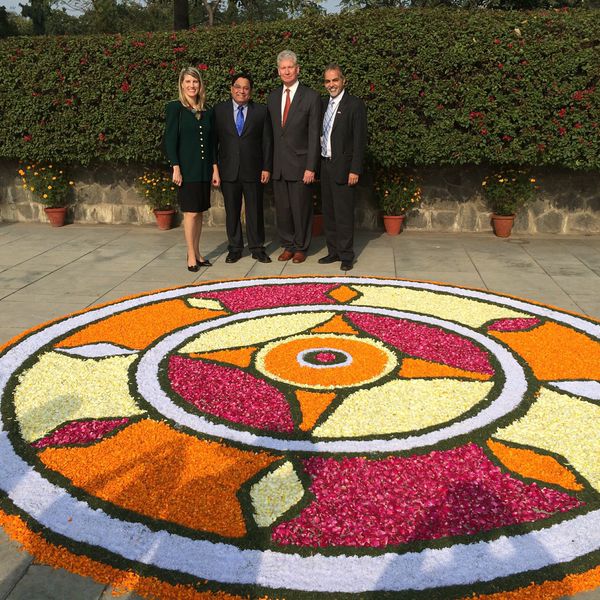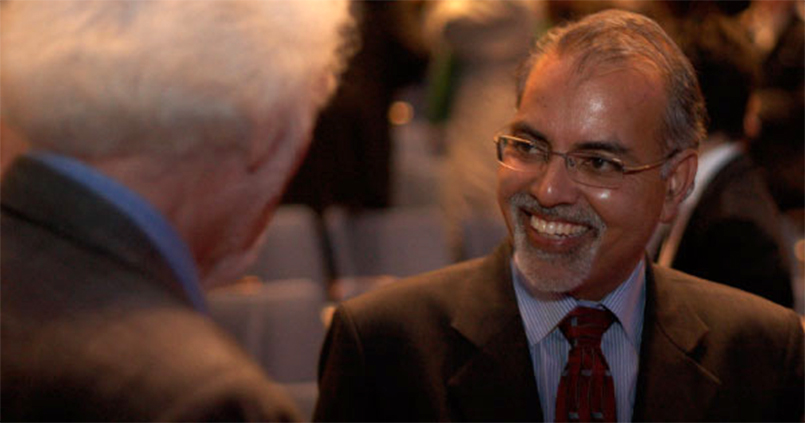
Asia Pacific Foundation Looks to Expand to South Asia
The new president of the Vancouver-based think tank is looking to expand Canadian relations with South Asia and Southeast Asia.
Asia Pacific Foundation’s new president, Stewart Beck, was Canada’s former High Commissioner to India, and has extensive experience working in the region. Barj Dhahan met with Mr. Beck in New Delhi earlier this year during a visit to India with the Governor General.
Business in Vancouver interviewed Beck and Barj Dhahan about the appointment and the value of expanding ties with South Asia and Southeast Asia.
Read an excerpt from “Stewart Beck: East-West Connector,” published in Business in Vancouver on August 25, 2014:
Vancouver businessman and philanthropist Barj Dhahan said Beck was a leader in focusing on not only entrepreneurship between India and Canada but also education during his tenure as high commissioner. Beck’s appointment to the foundation is timely, given the growth and opportunities in South Asia, said Dhahan, who is past chair of the Canada India Foundation.
“Stewart’s appointment is very timely because, as a country and a province, we are certainly looking at Asia, not just at China and Japan but all of Asia, South Asia and Southeast Asia. It’s timely that the foundation has a broader focus on all of Asia,” Dhahan said.
Beck is eager to apply his India experience, coupled with a career-long belief in educating young people on what he calls “business ecosystems,” to shape the next chapter for the foundation.
He wants the foundation to be well positioned to act as a catalyst to engage young entrepreneurs on both sides of the Pacific as regional Asian economies grow stronger.
“It’s the Wayne Gretzky thing: skate to where the puck is going to be,” Beck said. “That’s part of the role I think the foundation has.”
Beck’s hockey analogy comes from experience. Dhahan said that, along with other Canadian officials, the former high commissioner would host an ice hockey tournament in northern India to introduce young Indians to Canada’s national sport as a bridge-building exercise. He was known to bring shipments of hockey sticks, skates and pads from Canada to India.
“A lot of people in India know about our national sport as a result,” said Dhahan.
That kind of bridge building pays dividends for both countries, Dhahan said.

Richard Bales (Canadian Consul General, Mumbai) Governor General David Johnston, a guest, and Stewart Beck.
Read the full story at Business in Vancouver.

News: India untapped opportunity for B.C. companies
Originally published in Business in Vancouver on May 12, 2014.
The number of students from India enrolling in Simon Fraser University has been rising steadily over the past four years but business connections between India and British Columbia are still hampered by a lack of easy access, according to a Surrey businessman.
“India has gone through massive economic growth in the last 10 to 15 years,” said Barj Dhahan, who sits on Simon Fraser University’s India Advisory Council. “Amazing technological innovations are taking place in India. The middle class is growing by millions every year, the buying power in U.S. dollars is quite high, so those people have high aspirations for themselves and the goods and services they want. And so it offers opportunities for B.C., Surrey and Canadian businesses.”
That growth has brought more students to B.C. from India such that they now make up around 4% of SFU’s international enrolment, Dhahan said.
However, with that growth come growing pains. While Dhahan said India is receiving more recognition as a key international business partner, airline companies have been hesitant to follow suit.
A key barrier to increasing B.C.’s business connections and opportunities in India, he said, is the lack of non-stop air service from Vancouver to India’s major cities.
In November 2012, Business in Vancouver reported that Vancouver Airport Authority (YVR) executives were negotiating with carriers to launch non-stop flights to such places as Peru, Chile and India (“Airlines to launch new international non-stop services from Vancouver” – biv.com; November 20, 2012).
However, in an interview at the time, YVR director of aviation marketing John Korenic noted that strong demand for business-class tickets was key to the viability of non-stop flights between Vancouver and major cities in India such as New Delhi.
Anne Murray, YVR vice-president of marketing and communications, said Dhahan’s request is still on the authority’s radar.
“India is a market that we are very interested in. We are constantly looking for an airline partner that could provide non-stop flights to India, the largest market with no direct service from YVR.”


